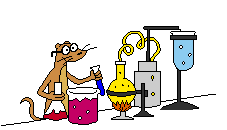Environmental pH |
|
Introduction:
A liquid may be an acid, base, or neutral. The pH scale can be used to measure how acidic or basic a solution is. The scale is divided into three areas: Acid (readings below 7), neutral (reading of 7), and basic (readings above 7). Each division either increase or decreases the pH of a substance 10 times. The pH of 5 is ten times more acidic than a pH of 6. Water has a pH of 7, but when it mixes with air, the suspended materials will either raise or lower its pH. Acid Rain is an example of this type of reaction.

Problem:
Students will determine the pH of various substances and their effect on organisms in the environment.
Materials:
Wide range pH paper and chart, spot plate, forceps, soapy water, lemon juice, ammonia, cola, distilled water, pond water, salt water, baking soda solution, 8 dropper bottles.
Procedure:
- Using a spot plate, place a couple of drops of each solution into the numbered wells being careful NOT to mix solutions. (Well 1- soapy water, well 2- lemon juice, well 3- ammonia, well 4 – cola, well 5 – distilled water, well 6 – pond water, well 7 – baking soda solution, well 8 – vinegar))
- Pick up a piece of pH paper with forceps.
- Touch the pH paper to the liquid in well # 1 and remove it.
- Compare the color of the pH paper to the pH color chart.
- Record the pH on your data table.
- Use a new piece of pH paper each time, and repeat steps 2 – 5 for each of the other solutions.
Data:
| Solution | pH | Acidic | Basic | Neutral |
| Soapy water | ||||
| Lemon juice | ||||
| Ammonia | ||||
| Cola | ||||
| Distilled water | ||||
| Pond water | ||||
| Baking soda | ||||
| Vinegar |
Analysis:
1. Which liquid had the lowest ph?
2. Which of the liquids had the highest pH?
3. Which of the liquids was closest to being neutral?
4. If the pH of a sample was 3, how many times more acidic is it than a solution with a pH of 6?
5. How might someone correct the pH of a lake with a reading of 3?
6. What would be the pH of human blood?
7. How does non-tearing shampoo work?
8. What would be the likely pH of acid rain?
9. What industries in our area pump materials into the atmosphere to create a drastic change in rain water? (Hint: Some days you can smell this industry.)
10. List any substances that had a pH that would cause tadpoles & fish to die.

